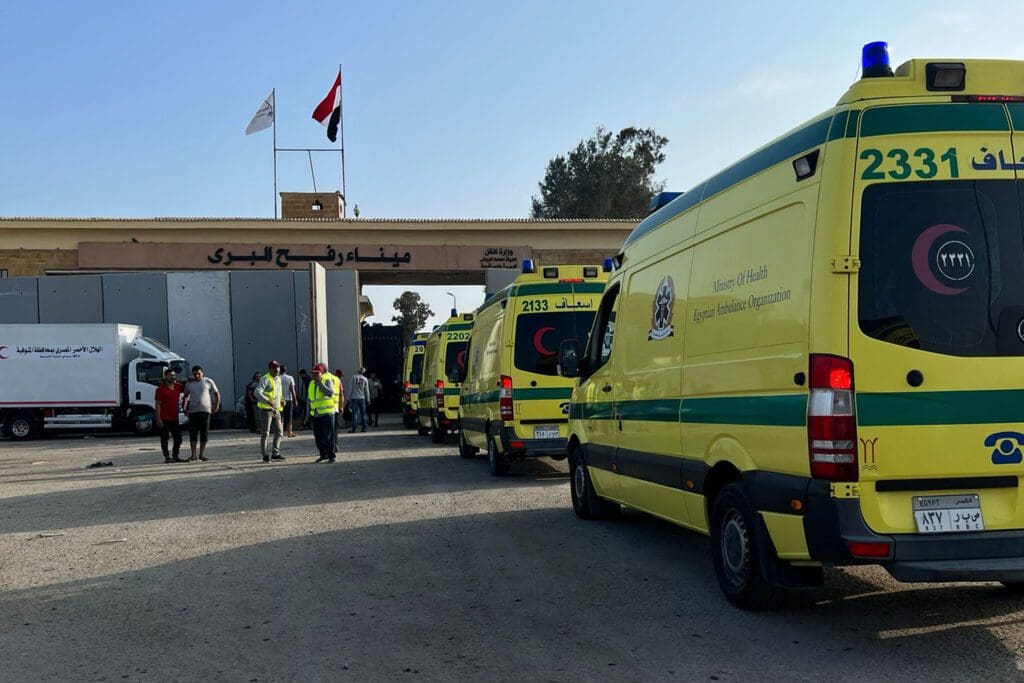As Israel steps up its brutal attack on the Gaza Strip with a ground invasion, a recently leaked concept paper from it’s Ministry of Intelligence adds to the mounting evidence that its ultimate goal is the forcible and permanent displacement of the besieged Gazans into neighboring Egypt’s Sinai Peninsula. In what effectively amounts to a premeditated plan of ethnic cleansing, the document outlined a three-point scheme to relocate Gaza’s residents to a tent city in Sinai, create a humanitarian corridor, and construct permanent cities in northern Sinai and a security zone to prevent Gazans from returning.
Israel’s Prime Minister Benjamin Netanyahu has reportedly urged European leaders to pressure Egypt into accepting refugees from Gaza, although key powers in Europe have dismissed the idea as unrealistic. Egypt’s president, Abdel-Fattah El-Sisi, has rejected such plans as “the liquidation of the Palestinian issue… at the expense of countries in the region.” Moustafa Madbouli, Egypt’s prime minister, paid a visit to the Sinai just a day after the aforementioned leaked report where he stressed that Egypt “[is] ready to sacrifice millions of lives so that nobody approaches a grain of sand [in northern Sinai].”
For Palestinians, the proposals have sparked fears of a “second Nakba,” equating the current moment to the forced displacement of 750,000 Palestinians by Zionist militias during the War of 1948. Gaza’s residents, many of them already refugees from the original Nakba and their descendants, are keenly aware that once they leave their land they will likely never be allowed to return.
Egypt, for its part, has staunchly rejected any violations of its sovereignty, and Sisi has emphasized that relocating residents of Gaza to northern Sinai would not be tolerated. A looming expulsion of Palestinians from Gaza into Sinai has galvanized an Egyptian public already discontent over Israel’s violent offensive in the besieged territory. Many have taken to the streets across major cities and at the Rafah crossing with Gaza chanting slogans such as “our land is not for sale.”
But with a rapidly deteriorating humanitarian crisis unfolding in Gaza, pressure on Egypt to open its borders will likely intensify. Moreover, Egypt is grappling with one of the worst economic crises in decades, with a staggering national debt, which could be another pressure point in efforts to bring Egypt along with Israel’s plans for Gaza.
Historical Precedents
The idea of resettling Palestinians in the Sinai is not new. In 1950, the United Nations proposed resettling thousands of Palestinians from Gaza in the Sinai Peninsula. That plan met with wide resistance from the refugees themselves and was eventually abandoned. Five years later, the U.S. and the United Kingdom initiated Operation Alpha, which aimed to resettle around 500,000 Palestinians in Syria, Lebanon, Jordan, Iraq, and Egypt’s Sinai. In return, the U.S. pledged to support Egypt both militarily and financially—with the construction of the Aswan Dam. However, President Gamal Abdel Nasser ultimately turned to the Soviets to fund the project.
In 2018, while the Trump administration prepared its proposal for resolving the Israeli-Palestinian conflict, the U.S. and Israel pushed Egypt to allocate land in northern Sinai for Gazans to work and potentially settle.
Since October 7 and Hamas’ “Al Aqsa Flood” operation, the idea of a mass population transfer has been a major part of the Israeli public discourse. A think tank close to Benjamin Netanyahu outlined a similar plan to that of the intelligence ministry, advocating for the “relocation and final settlement of the entire Gaza population” in Sinai. Former Deputy Foreign Minister Danny Ayalon declared that “Gazans … [should] go to the Sinai Desert.”
Washington is reportedly leveraging Egypt’s foreign debt, currently more than $165 billion, to push Cairo to allow Palestinians access to the Rafah crossing. This situation echoes a 1991 deal with then-President Hosni Mubarak under which half of Egypt’s debt was forgiven in exchange for its support in the Gulf War. Given that Egypt’s military is currently the second largest recipient of U.S. assistance, after Israel, the Biden administration could threaten to withhold its aid as another form of pressure on Cairo.
Security Considerations
An exodus of Palestinians from Gaza into the Sinai Peninsula would present Egypt with even more difficult security and economic challenges than it already faces.
The Sinai has long been a thorn in the side of the Egyptian government, which has had trouble exercising control over the region’s diverse array of Bedouin tribes, militant groups, criminal gangs and smugglers. Egypt’s revolution in 2011 only added to the lawlessness prevailing in the peninsula.
From 2013 onwards, ISIS affiliated groups such as Ansar Beit al-Maqdis and Wilayat Sinai carried out a series of violent attacks against Egyptian military forces in Rafah. In response, Egypt launched several military campaigns that often forced the government to seal the crossing with Gaza as a security measure.
As a militant organization operating in Gaza with ties to the Muslim Brotherhood, Hamas has always been a security factor for Egypt, particularly in relation to the Sinai. When Hamas seized control over Gaza in a power struggle with the Palestinian Authority in 2007, Egypt participated in the ensuing blockade of Gaza imposed by Israel. While the relationship between Cairo and Hamas has been tense, particularly after El-Sisi came to power in 2013, a rapprochement of sorts occurred in 2017, when Egypt leveraged its control over the besieged strip to get Hamas’ cooperation in its counterinsurgency campaign in the Sinai.
Despite Cairo announcing victory in its “war on terror” earlier this year, which has largely played out in the peninsula, the Sinai remains a hotbed for violence with precarious security conditions. Now, Egypt is concerned over what a large influx of Palestinian refugees from Gaza would mean for the security situation that it has only recently gotten under control, particularly if it means Palestinian militants would begin operating from Egypt’s sovereign territory, much like they had from Jordan and Lebanon in the past.
Furthermore, Egypt already hosts around 9 million migrants mainly from elsewhere in Africa, including at least 300,000 Sudanese refugees that arrived in 2023 as a result of a civil war. Existing economic strains complicate Egypt’s ability to host additional refugees, which will require a holistic assessment entailing Egypt’s financial and infrastructural capacity for this undertaking. As the border gradually opens to accommodate a limited number of foreign nationals crossing out of Gaza along with injured Palestinians and aid trucks, the possibility of a wider opening grows.
However, the function of the crossing as a key channel for the transportation of essential supplies into Gaza and provision of humanitarian assistance necessitates sustaining a stable environment around the border. This will prove difficult as Israel’s offensive rages on, raising prospects for violent confrontations on the Egypt-Palestine border. In late October, Egyptian soldiers suffered injuries due to an alleged accidental Israeli attack on the border, according to Israel’s military.
Avoiding Nakba 2.0
The humanitarian crisis in Gaza is growing increasingly dire, as Israel’s decision to cut off food, water, electricity, and fuel supplies takes its toll amid one of the most aggressive bombing campaigns in history. Egypt has been facilitating international efforts to provide aid into Gaza from countries such as Türkiye and Bahrain, but Israel has put tight restrictions on the entry of supplies, including bombing the Egyptian border crossing multiple times and threatening to strike aid trucks, as well.
As of November 7, around 500 trucks were granted entry into Gaza since the fighting began, a sharp decline from the 500 trucks per day that once serviced Gaza. At the current rate, supplies are far from sufficient, especially considering limitations on the entry of fuel, essential to powering critical infrastructure across Gaza. The World Food Programme reported that of the 23 bakeries that it worked with, 21 ceased operations due to fuel shortages and over a third of hospitals in Gaza have been forced to close.
As the situation worsens, pressure will undoubtedly increase on Egypt to open its borders to Palestinians. But given the experience of countries like Jordan and Lebanon, who have hosted millions of Palestinian refugees denied their right to return to their homes, Cairo should maintain its opposition to Israeli plans to force Palestinians out of Gaza. This stance will be tested by the U.S. and European backers of Israel, who will likely push Egyptian pressure points to force it to comply. Yet Egypt should remain firm knowing the likely outcome.
While this position is difficult, the solution to Israel’s perpetration of war crimes, including a potential ethnic cleansing and even genocide, does not lie in the Sinai. What is now needed is a cease fire and international pressure to allow more humanitarian aid into Gaza, as a first step to stop the humanitarian catastrophe unfolding in the Gaza Strip.



